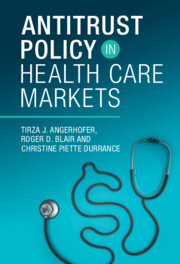Book contents
- Antitrust Policy in Health Care Markets
- Antitrust Policy in Health Care Markets
- Copyright page
- Dedication
- Contents
- Figures
- Tables
- Acknowledgments
- Table of Cases
- 1 Health Care Markets and Competition Policy
- 2 Antitrust Policy in the United States
- Part I Monopoly
- Part II Seller Cartels
- 6 Collusion in Health Care Markets
- 7 Collusion in Generic Drug Markets
- 8 The Hatch-Waxman Act, Patent Infringement Suits, and Reverse Payments
- 9 The Alleged Insulin Conspiracy
- 10 Licensing of Health Care Professionals
- Part III Monopsony
- Part IV Buyer Cartels
- Part V Mergers and Acquisitions
- Index
- References
7 - Collusion in Generic Drug Markets
from Part II - Seller Cartels
Published online by Cambridge University Press: 24 November 2022
- Antitrust Policy in Health Care Markets
- Antitrust Policy in Health Care Markets
- Copyright page
- Dedication
- Contents
- Figures
- Tables
- Acknowledgments
- Table of Cases
- 1 Health Care Markets and Competition Policy
- 2 Antitrust Policy in the United States
- Part I Monopoly
- Part II Seller Cartels
- 6 Collusion in Health Care Markets
- 7 Collusion in Generic Drug Markets
- 8 The Hatch-Waxman Act, Patent Infringement Suits, and Reverse Payments
- 9 The Alleged Insulin Conspiracy
- 10 Licensing of Health Care Professionals
- Part III Monopsony
- Part IV Buyer Cartels
- Part V Mergers and Acquisitions
- Index
- References
Summary
When a patent on a pharmaceutical product expires, therapeutically equivalent generic versions of the drug rapidly enter the market. Competition among the generic producers ordinarily causes the price of drugs to plummet. This, of course, is socially beneficial since consumers are considerably better off. Health insurers are also better off because the costs of insurance claims fall. Nearly everyone gains – except for the pioneer firm whose patent monopoly has expired. For many generic drugs, however, this scenario has failed to materialize because the generic producers allegedly decided to collude rather than compete. Various state attorneys general have filed complaints against 30 well-known generic drug manufacturers for their alleged collusion of more than 160 pharmaceutical drugs. The complaints allege that a large-scale cartel engaged in price fixing, customer allocation, and bid rigging in the market for generic drugs, leading to higher prices and lower sales.
Keywords
- Type
- Chapter
- Information
- Antitrust Policy in Health Care Markets , pp. 136 - 167Publisher: Cambridge University PressPrint publication year: 2022

